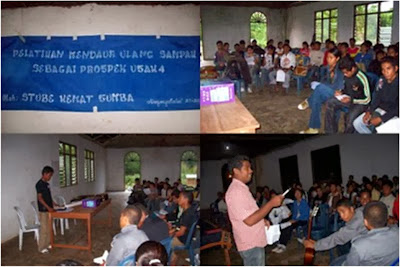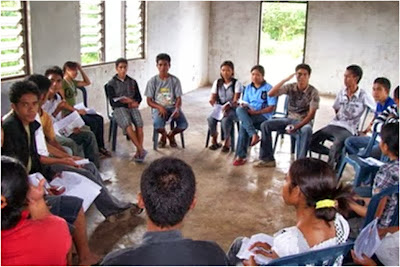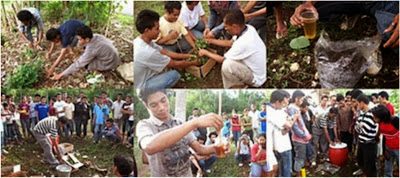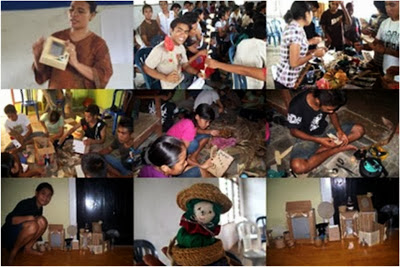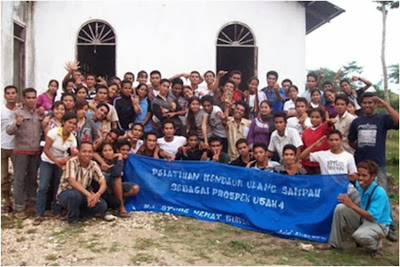Rubbish is a big problem if there is no serious treatment of all parties, both government and society. Several years before the problems appear due to congestion caused by lack of further waste management. During the study in Yogyakarta, Stube HEMAT Sumba coordinator learned that there are several places in Yogyakarta in managing garbage independently. Seeing this Stube HEMAT Sumba will give information and open chances in garbage management. Garbage such as bin, paper, plastic and organic material may be processed be a valuable thing and have price to sell. Besides that however, the principle is as a response to preserve earth and awaken people’s awareness to nature, health and cleanliness. Since it is first issue ever conducted by Stube HEMAT Sumba, it is kind of an orientation training to know how participants’ reaction on garbage management and change the mindset to care of it.
The training is held on December 27 - 29, 2009. Followed by 60 participants consisting of 22 female and 38 male, this training placed on Christian Church of Sumba Kanjonga Bakul (Praipaha). So many number participants gather in Stube HEMAT secretary. It is one of signals that this theme induces the participants to know. High rate of unemployment may be one of factors that so many young people want to learn to empower themselves facing the future. It is also become one concerned of Stube HEMAT Sumba to make them out of old mind set of dependency on job market.
The photo is taken when they pray before leaving to training destination, Praipaha.
It is in the evening arriving Praipaha, and participants are preparing everything to start the training. As usual, opening worship is the first schedule. Followed by introduction session and having learning contract during three days training. This training is carried out with participation of all participants. Every one will occupy a task in order to support the training running well. Further, every one will know how to handle training with its difficulties and finally they will appreciate what they have.
Stube HEMAT Sumba coordinator also delivers a session what Stube HEMAT is so the participants especially the new comers know the vision and mission of this student service in Sumba and Indonesia as a whole. Stube HEMAT opens widely for every student to join and follow programs as long as they want to learn and open minds.
The second day is the first day for material, delivered by Ir. Sartje H.O. Wilahuky. She delivers a session with topic of “how to control garbage". Effort to reduce waste will not run well if it is done by one part of society. Indeed there are the stake holders related with this problem management. They are responsible on how to solve this problem involving government and society. Government is in charge with policy and the management system and society awareness will support the system to run. Not littering anywhere is a simple thing may be done by anyone.
Kristo Prahara I Wudi, a participant asks that it is an ideal one to have waste management but in fact, the problems are growing worse. Cities are over flow, even Jakarta, the capital of Indonesia, the face of nation is also badly overflowed. What is actually government has done in waste management and solving the problems?
Sartje replies that such question is not only addressed to government but also to the society. Do we have awareness to environmental problems such as garbage since the actors are society?
Government cannot work waste policy without support from the society. Real action has been done by government by collecting garbage of the people everyday, builds sewage system and issuing regulation related with garbage. Once again people are the actors. Dominggus B. Lende asks to Sartje what she has done related with garbage problem in Sumba. As an environmental watch member, she has worked with some environment agencies to propagandize and socialize recycle program.
Further, organic fertilizer can be made from the organic waste. Now, she provides organic fertilizer, compost, for vegetables farmers in Waingapu and surroundings. Sartje then asks participants to analyze waste, garbage, sewage problem in Sumba and then present the findings in front all.
The next session is talking about waste management with ecological approaches. Why waste should be discussed? Because of industrial growth with its possibilities to increase waste, lifestyles changes, consumption patterns threaten human environment. The material is presented by Umbu Bahi. How Participants want to know further the usage of organic waste, how to make and market it.
After the presentation of material and participants are divided into several groups. Each group has a certain topic related with environment, waste and human to discuss. Participants get further explanation about recycling organic waste in the form of organic fertilizer. In addition, they learn that the decomposing substances may be made by themselves to fasten the rotten process. Then they follow the practice. The participants are divided into groups and each group has its own task to do, such as collecting animal dunks, dry leaves or fresh leaves. When materials are already collected, Umbu Bahi demonstrates how to make organic fertilizer. All participants are interested to listen and watch the process.
Sunday morning in the church service of Kanjonga Bakul where the training is held, the participants of the training perform a choir. The members of the church are very happy to see that their church is used by students to learn something useful.
When the church service is over, the place is used again as a training place. The next session is delivered by Merliaty, M.Sc. She delivers how to make handicraft from waste material that will be worthy to sell. She shows how to recycle all materials such as plastic, dried flower and leaves, cardboard, stones and any other materials. She shows the product and encourages participants to make by themselves. First she tells the theory and the spirit behind her business she does. The participants are listening and encouraged to enter the process.
Merliaty then divides them into some groups with specific task for each like group of flower-maker, picture frame maker, paper container and bag maker. They are very happy to do it together before completing all activities in the training as a whole.
FOLLOW UP ACTIVITIES
Carried out in the secretary of Stube HEMAT Sumba, participants want to practice further what they have got in the training. They teach and remind each other the theory. They individually make whatever they like to make use the provided materials. They collect some addition material to complete their work such as empty bins, bottle, paper, and little stone, plastic and so on. Collection of works made covering photo frame, Bible bags, tissue box, stationery container and many other things.
In general much impression following the training is written as their comment. Their mind set change much seeing the potency of the surrounding nature even garbage indeed. Sense of optimist loads their heart to face the future.



